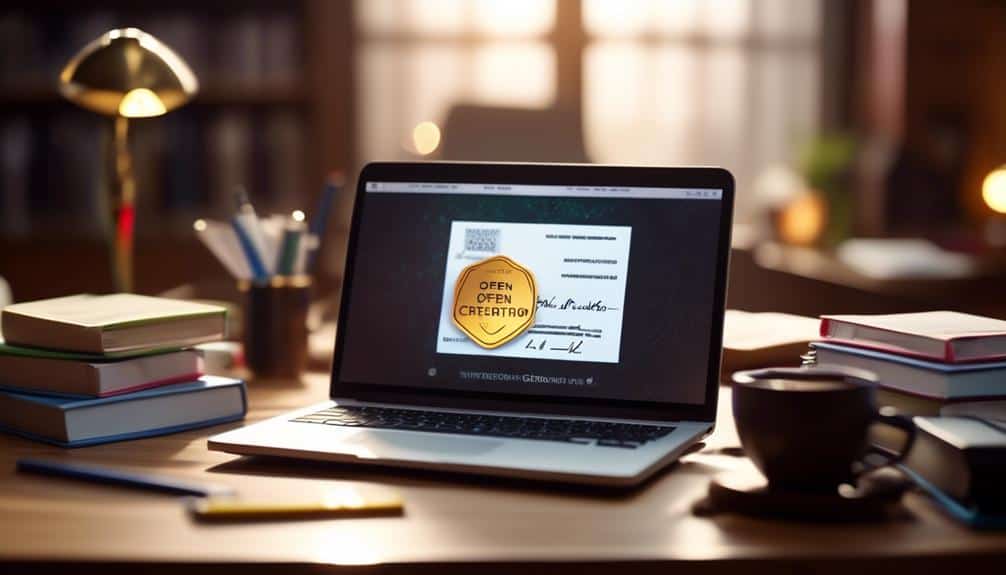- Key Takeaways
- Understanding the Basics of IT Auditing
- Enhancing Technical Knowledge and Skills
- Acquiring Relevant Certifications
- Gaining Practical Experience in IT Auditing
- Frequently Asked Questions
- What Are Some Common Challenges That IT Auditors Face in Their Role and How Can They Overcome Them?
- How Important Is Networking in the Field of IT Auditing and What Are Some Ways to Effectively Network?
- What Key Soft Skills Should an IT Auditor Develop to Be Successful in Their Role?
- How Do IT AudITors Maintain Their Skills and Knowledge Up-To-Date WITh the Rapidly Evolving Technology Landscape?”
- What Steps Should an Individual Take to Transition Into a Managerial Role WIThin IT Auditing?
- Conclusion
‘Practice makes perfect,’ they say, and nowhere is this adage more applicable than in the world of IT auditing. As someone with a keen interest in this field, you’re aware that it takes more than just understanding the basics to excel.
So, what exactly does it take? Well, to truly shine, you’ll need to enhance your technical knowledge, acquire relevant certifications, and gain practical experience. In the upcoming sections, we’ll be breaking down each of these steps, providing you with a comprehensive guide to cultivating your IT auditing abilities.
But first, let’s ask ourselves, why should we bother in the first place? What’s the real value in becoming proficient in IT auditing?
Key Takeaways
- Understand the fundamental principles and processes of IT auditing
- Enhance technical knowledge and skills in operating systems, coding languages, networking, cybersecurity, and cloud computing
- Acquire relevant certifications like CISA, CIA, and CISM to demonstrate expertise in IT auditing
- Gain practical experience through internships, entry-level positions, and involvement in audit projects, risk assessment, and compliance with regulations
- Continuously learn and develop through workshops, seminars, training programs, networking with professionals, and staying updated with industry trends and advancements
Understanding the Basics of IT Auditing
Diving into the realm of IT auditing, you must first grasp the fundamental principles, which include understanding the role of an IT auditor, the processes involved, and the significance of adherence to compliance standards. It’s a complex space, but fear not, you’re capable of mastering the ropes.
As an IT auditor, you’re the watchdog of the system. Your task is to ensure the integrity, confidentiality, and availability of data within an organization. You’ll scrutinize the company’s IT systems, practices, and operations to pinpoint vulnerabilities and risks. You’ll be the frontline defense against threats like data breaches and cyber-attacks.
The process, you’ll find, is methodical. You’ll start with planning, where you’ll define the scope and objectives of the audit. Next, you’ll conduct fieldwork, examining policies, procedures, and systems. You’ll then analyze findings, draw conclusions, and prepare a detailed report. You’ll often present these findings to management, suggesting improvements where necessary.
Adherence to compliance standards is non-negotiable. You’ll navigate numerous regulations like the Sarbanes-Oxley Act (SOX), the Health Insurance Portability and Accountability Act (HIPAA), or the General Data Protection Regulation (GDPR). You’ll ensure the organization is compliant, avoiding penalties, and safeguarding its reputation.
The IT auditing journey won’t always be easy, but remember, it’s your stepping-stone to greater freedom. The knowledge you gain will empower you to make informed decisions that can impact the organization’s security posture positively. So, dive in, immerse yourself in the details, and let the process of understanding the basics of IT auditing set you free.
Enhancing Technical Knowledge and Skills
Boosting your technical prowess and skills is paramount in your journey to becoming an adept IT auditor. It’s not just about understanding concepts and theories, it’s about integrating them into your daily work, applying them in different contexts, and using them to solve complex problems.
You might wonder, ‘How do I enhance my technical knowledge?’ First, you need to be well-versed in different operating systems and databases. Don’t limit yourself to Windows and Linux; explore Unix, Oracle, and SQL Server too. Becoming proficient in coding languages such as Java, Python, or C++ will also be of great advantage.
Second, you’ve got to dive into networking and cybersecurity. Understanding how data travels, how networks are configured, and how to protect an organization’s data are all critical aspects of an IT auditor’s role. Get certifications like CCNA, CISSP, or CISA. They don’t just add to your credentials, they’ll deepen your technical knowledge too.
Third, embrace the realm of cloud computing. With businesses increasingly moving their operations to the cloud, you need to understand how these platforms work, how they’re secured, and how to audit them.
Lastly, keep yourself updated. IT is a rapidly evolving field. New technologies, tools, and threats emerge every day. Participate in webinars, follow IT blogs, join forums. This will keep you on your toes and ready to handle whatever the IT audit world throws at you.
Acquiring Relevant Certifications
In your journey to become a superior IT auditor, earning relevant certifications is a crucial step that can significantly enhance your credibility and expertise in the field. Such certifications not only augment your resume but also provide a strong foundation in auditing principles, tools, and best practices.
There’s a bevy of certifications out there, but you’d want to focus on those most pertinent to IT auditing. Certifications like Certified Information Systems Auditor (CISA), Certified Internal Auditor (CIA), and Certified Information Security Manager (CISM) are widely recognized and respected. These certifications validate your ability to manage vulnerabilities, ensure compliance with standards, and implement controls within the enterprise’s architecture.
Earning these isn’t a cakewalk, though. You’ll need to display a solid understanding of IT auditing and the ability to apply this knowledge in real-world scenarios. These exams are rigorous and require a significant investment of time and effort. But don’t fret, the potential payoff in terms of career advancement and increased earning potential makes it worth the grind.
As you’re pursuing these certifications, it’s important to stay current with industry trends and advancements. Continuous learning and development are crucial. Participate in workshops, seminars, and training programs. Engage with fellow IT auditors and professionals in relevant forums and online communities. This will help you stay ahead of the curve and be ready to tackle new challenges that come your way.
In essence, acquiring relevant certifications is an essential part of your IT auditor journey. It not only validates your expertise but also equips you with the skills needed to excel in this dynamic field.
Gaining Practical Experience in IT Auditing
While earning certifications sharpens your theoretical knowledge, nothing beats the hands-on learning you’ll gain from practical experience in IT auditing. Engaging directly with the complex issues that occur in the field can equip you with a deeper understanding of the practical applications of your theoretical knowledge.
You can gain this invaluable experience in several ways:
- Internships or entry-level positions: These offer an excellent opportunity to learn from seasoned professionals. You’ll get to see how IT audit processes function in a real-world scenario.
- Work on actual audit projects under supervision
- Participate in risk assessment and control testing
- Develop understanding of compliance with regulations
- Volunteering or part-time jobs: If full-time employment isn’t an option, there are still ways to gain experience.
- Offer your services to local non-profits or small businesses
- Work as a freelancer, taking on small IT audit projects
- Learn to manage and communicate with clients
- In-house training programs: Some companies offer programs to employees interested in moving into IT auditing.
- Engage in company-sponsored training and development programs
- Learn about specific IT audit processes and tools used in your organization
- Apply your learning directly on the job
Frequently Asked Questions
What Are Some Common Challenges That IT Auditors Face in Their Role and How Can They Overcome Them?
As an IT auditor, you’ll often face challenges like keeping up with rapidly changing technology and ensuring data security.
To overcome them, you’re encouraged to constantly update your knowledge, attend relevant training, and stay informed about the latest trends and advancements in IT.
How Important Is Networking in the Field of IT Auditing and What Are Some Ways to Effectively Network?
Networking in IT auditing is crucial. You’re not just sharing ideas, but also learning about emerging risks and controls.
Start by joining professional bodies like ISACA. Attend their events and actively participate in discussions. Online forums and social media platforms also offer great opportunities.
Don’t just lurk, engage! Remember, it’s about building relationships. So, help others when you can, and don’t be afraid to ask for help.
You’ll be surprised at how much you’ll learn.
What Key Soft Skills Should an IT Auditor Develop to Be Successful in Their Role?
To excel as an IT auditor, you’ll need to hone key soft skills.
Communication is paramount; you’ll often explain complex tech issues to non-tech staff.
Critical thinking helps you spot inconsistencies and potential risks.
Problem-solving ability lets you find efficient solutions.
Lastly, adaptability is key in a rapidly evolving field.
By cultivating these skills, you’ll not only perform your role effectively but also earn the respect and trust of your team.
How Do IT AudITors Maintain Their Skills and Knowledge Up-To-Date WITh the Rapidly Evolving Technology Landscape?”
To keep your IT auditing skills sharp in a fast-paced tech world, you’ve got to stay hungry for knowledge.
Immerse yourself in tech blogs, webinars, and training courses. Attend industry conferences and network with peers.
Pursue certifications that’ll beef up your expertise. Remember, it’s survival of the fittest out here.
Don’t let your skills become extinct in this digital jungle. Adapt, evolve, and conquer.
What Steps Should an Individual Take to Transition Into a Managerial Role WIThin IT Auditing?
To transition into a managerial role within IT auditing, you’d first need to master technical skills. You should deepen your understanding of IT systems, data analysis, and relevant regulations.
Next, develop your people skills. You’ll be leading a team, so effective communication and motivational abilities are key.
Lastly, consider pursuing advanced certifications, such as Certified Information Systems Auditor (CISA) or Certified Information Security Manager (CISM). These demonstrate your commitment and expertise.
Conclusion
In conclusion, mastering IT auditing isn’t just about knowing the basics. It’s a blend of honing your technical prowess, earning relevant certifications, and gaining hands-on experience.
Like a blacksmith tempering steel, these elements forge your auditing skills into a formidable tool.
So, don’t just dip your toes in the water; dive in headfirst, and watch your IT auditing abilities flourish.
Remember, it’s not just about learning; it’s about becoming a master in your craft.









